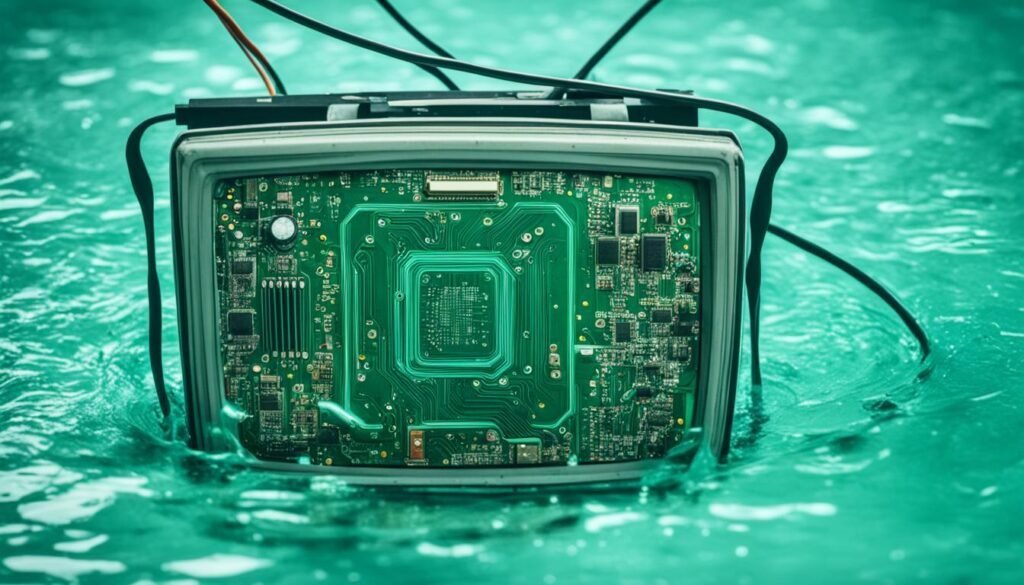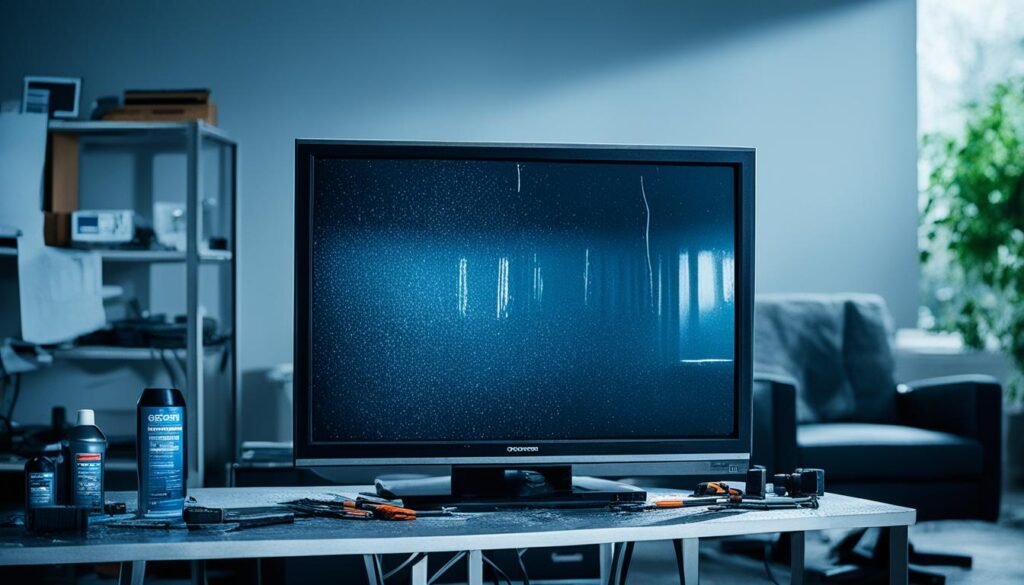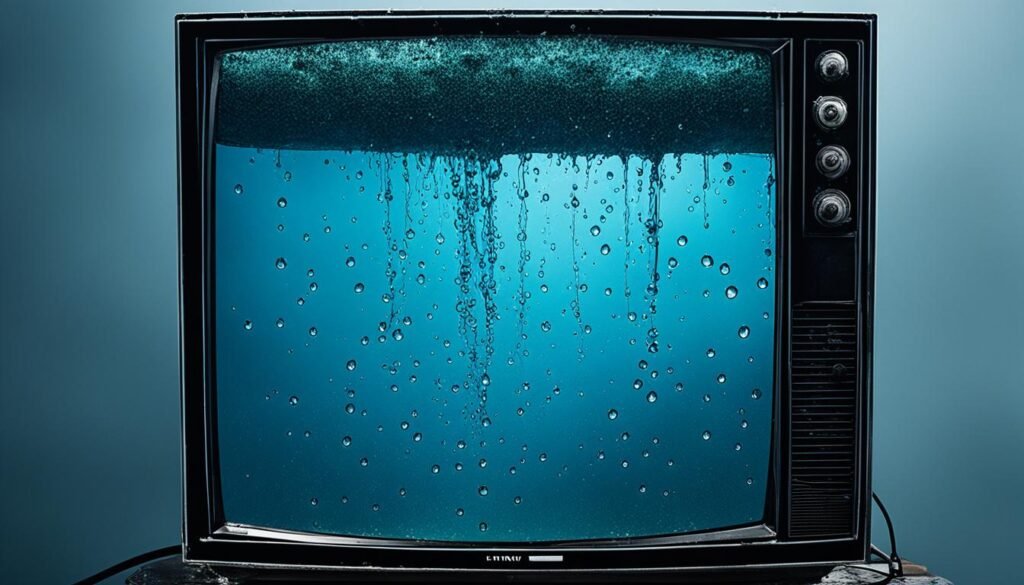Did you know that over 15 million TVs get damaged by water each year in the U.S.? It could be from a spilled drink, a leaky pipe, or a flooded room. But don’t worry – you can often fix your water-damaged TV and make it look and work like new again.
Key Takeaways
- Disconnect the TV from power immediately to prevent further electrical damage
- Use 99%+ isopropyl alcohol to clean and dry out water-affected circuit boards
- Inspect for screen and internal component damage, which may require professional repair
- Act quickly to mitigate water damage and increase the chances of successful restoration
- Consider the cost-effectiveness of repair vs. replacement for severe water damage
Assessing the Extent of Water Damage
Fixing a water-damaged TV starts with checking how much damage there is. Luckily, not every spill or moisture issue will ruin your TV. But, even a little water can cause big problems that need expert help. Let’s look at the differences between minor and major water damage, and how to check for damage to the screen and inside.
Identifying Minimal vs. Heavy Water Exposure
A small spill or some condensation might not be the end for your TV. If the water didn’t get to the main power parts, you might be able to fix it with cleaning and drying. First, unplug the TV, then dry it with a soft cloth. Don’t use a hairdryer because it could damage the screen.
If your TV got a lot of water damage, like being fully submerged, it’s likely too far gone. In this case, a pro from FloodFixers should check it before you try to fix it yourself. Fixing a TV this badly yourself could cause more harm and might cancel the warranty.
Checking for Screen and Internal Component Damage
After figuring out the water damage level, check the TV’s screen and inside for damage. Watch for things like discoloration, blotchy or rainbow-like patterns, flickering, or a completely white or blank screen. These signs mean water might have hurt the inside parts.
If you see these issues, stop using the TV and unplug it. Using a water-damaged TV could cause a short circuit, making things worse and even be dangerous. Call a pro TV repair service right away to check it out and figure out how to fix it.
“Attempting to repair a severely water-logged TV yourself could lead to further damage and may even void the warranty.”
how to fix water damaged tv
Step-by-Step Guide for Minor Water Spills
If you’ve had a minor water spill on your TV, here’s what you can do. First, unplug the TV. Then, use a dry cloth to wipe up any water on the screen and edges. Make sure to get every drop of water out to prevent further damage.
Don’t use a hairdryer or other heat source to dry the TV. High temperatures can warp or distort the inside parts. This could make things worse.
Professional Repair Recommendations for Severe Damage
If the water damage is severe, you should get a pro to check it out. They can tell you if it’s worth fixing or if you need a new TV. Trying to fix it yourself could cause more problems and might even void the warranty.
In Moreno Valley, FloodFixers is a great choice for fixing water-damaged TVs. They have the skills and tools to fix your TV and make it look new again.

“When it comes to water-affected TV repair, it’s always better to be safe than sorry. Attempting to fix a severely liquid-damaged television screen on your own can lead to even more costly issues down the line.”
Common Water Damage Issues and Solutions
Water damage can cause many problems for your TV, like rainbow screens and flickering displays. It can also lead to white screens and line patterns. Knowing what causes these issues and how to fix them can help you fix your water-damaged TV.
Troubleshooting Rainbow Screens and Flickering
A rainbow screen often means a faulty LVDS (Low-Voltage Differential Signaling) cable is to blame. This cable sends digital video and audio signals from the main board to the display panel. Check the LVDS cable for damage or loose connections and replace it if needed.
Flickering and sudden shut-offs might mean a problem with the inverter board or a failed secondary capacitor. The inverter changes the TV’s DC power to the high-voltage AC needed by the backlight. A professional can fix or replace these parts for a stable picture.
Addressing White Screens and Line Patterns
A white screen usually means a problem with the power supply unit (PSU) in the TV. This could be due to failed electrolytic capacitors or wiring issues. Check the PSU and replace any faulty parts to fix the display.
Line patterns on the screen often come from a connection issue between the driver board and the display panel. This could be from water damage to the connectors or internal parts. A professional can find and fix the problem for a clear image.
| Issue | Possible Cause | Solution |
|---|---|---|
| Rainbow Screen | Faulty LVDS cable | Check and replace the LVDS cable |
| Flickering and Sudden Shut-offs | Failed inverter board or secondary capacitor | Replace the faulty inverter components |
| White Screen | Power supply unit (PSU) issues | Check and replace faulty PSU components |
| Line Patterns | Connection problem between driver board and display panel | Repair the connection issue |
Knowing about common water damage issues and solutions can help you fix your water-damaged TV. For severe or complex problems, it’s best to get help from a professional FloodFixers repair service. They can ensure your TV is fixed right and protected from future water damage.

Conclusion
Water damage can be a big problem for your TV, but you might fix it with the right steps. First, unplug the device, dry it well, and check for water signs. For small spills, use Isopropyl Alcohol to clean the parts. But, for big damage, get a pro to check it out.
Trying to fix it yourself could cause more harm and ruin your warranty. So, be careful. By using the advice in this guide, you can fix your water-damaged TV and enjoy your shows and movies again.
Dealing with water damage can be tough, but knowing what to do can help. If the damage is too much, don’t hesitate to get professional help. This is often the best way to fix it right and keep your TV working well for a long time.

